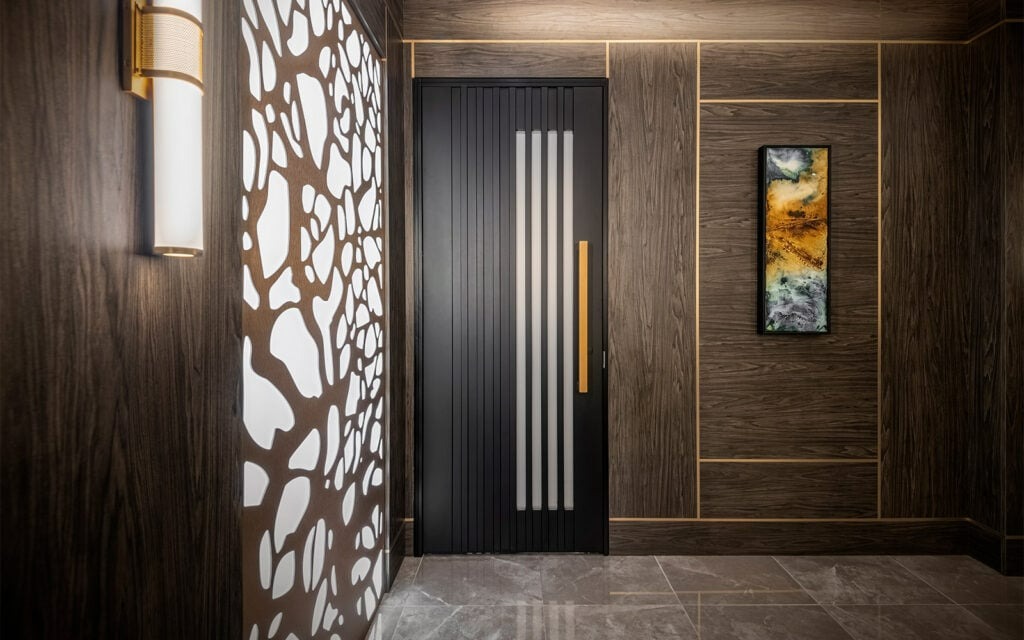Choosing the Perfect Bedroom Doors: A Comprehensive Guide

When designing or renovating a bedroom, one of the most essential yet often overlooked elements is the bedroom door. The right door not only enhances the aesthetic appeal of your bedroom but also plays a crucial role in providing privacy, sound insulation, and overall comfort. With a variety of styles, materials, and finishes available in the market, selecting the perfect bedroom door can be a daunting task. This comprehensive guide will walk you through everything you need to know to make an informed decision, from different door types to material choices and installation considerations.
1. Why Choosing the Right Bedroom Door Matters
The bedroom door serves multiple purposes beyond just separating the space from the rest of the house. Here are the key reasons why selecting the right door is important:
A. Privacy and Security
One of the primary functions of a bedroom door is to provide privacy. Whether you live alone or with others, your bedroom should be a sanctuary, and a good door helps ensure your privacy is maintained. A sturdy and well-fitted door also contributes to the security of your personal space.
B. Sound Insulation
For a peaceful and quiet bedroom environment, sound insulation is critical. The type of door you choose can significantly impact the level of sound that passes through. Solid-core doors, for example, provide better sound insulation than hollow-core doors, making them ideal for bedrooms.
C. Aesthetic Appeal
Bedroom doors are not just functional; they also contribute to the overall interior design of the room. The right door should complement your bedroom’s décor, whether you’re going for a modern, traditional, or rustic look. A well-chosen door enhances the room’s visual appeal and adds a finishing touch to your space.
D. Durability and Maintenance
Bedrooms are high-traffic areas, especially in family homes, so it’s essential to choose a door that is durable and easy to maintain. Materials like solid wood or engineered wood offer long-lasting durability, while finishes like painted or stained doors can be cleaned with ease.
2. Types of Bedroom Doors
When it comes to bedroom doors, there are several styles to choose from, each with its unique benefits. Below are some of the most popular types of bedroom doors available:
A. Hinged Doors
Hinged doors are the most common type of interior doors, swinging open and closed on a hinge. They are widely used for bedrooms due to their simplicity and functionality. These doors come in a variety of materials and designs, ranging from traditional paneled doors to modern flat-panel doors.
- Advantages: Easy to install, widely available in various designs, and suitable for most bedroom layouts.
- Disadvantages: Hinged doors require clear space to swing open, which might not be ideal for smaller bedrooms.
B. Sliding Doors
Sliding doors are a space-saving alternative to hinged doors, ideal for rooms where floor space is limited. These doors slide along a track rather than swinging open, making them a practical choice for compact bedrooms.
- Advantages: Space-saving design, modern aesthetic, and suitable for small rooms.
- Disadvantages: Sliding doors may not provide as much sound insulation as solid hinged doors.
C. Bi-Fold Doors
Bi-fold doors are made of two or more panels that fold together when opened. They are often used for closets but can also be an interesting choice for bedrooms, especially for rooms with limited space.
- Advantages: Space-efficient, unique design, and versatile.
- Disadvantages: May not provide the same level of privacy or insulation as traditional doors.
D. Pocket Doors
Pocket doors slide into a wall cavity when opened, completely disappearing from view. This style is perfect for modern bedrooms with minimalist designs, and they are great space-savers.
- Advantages: Maximum space-saving option, hidden when opened, sleek and modern look.
- Disadvantages: More complicated installation process and potential difficulty with repairs if the sliding mechanism malfunctions.
E. French Doors
For a more elegant and sophisticated look, French doors are an excellent choice. These doors usually come in pairs and are hinged on the sides, opening outward or inward. French doors often feature glass panels, adding a touch of luxury to the bedroom.
- Advantages: Stylish and elegant, can make the room appear larger and brighter if glass panels are included.
- Disadvantages: Require more space to open, may not provide as much privacy if glass panels are used.
3. Material Options for Bedroom Doors
The material you choose for your bedroom door will affect its durability, appearance, sound insulation, and cost. Here are the most common materials used in bedroom doors:
A. Solid Wood Doors
Solid wood doors are a popular choice for bedrooms due to their durability, strength, and natural beauty. They offer excellent sound insulation and a warm, classic appearance that works well in both traditional and contemporary settings.
- Advantages: High durability, excellent soundproofing, and a timeless look.
- Disadvantages: Heavier and more expensive than other materials.
B. Hollow-Core Doors
Hollow-core doors are made with a lightweight inner core and a veneer or laminate exterior. These doors are more affordable and easier to install, making them a budget-friendly option for bedrooms. However, they offer less sound insulation compared to solid-core doors.
- Advantages: Lightweight, affordable, and easy to install.
- Disadvantages: Lower sound insulation and less durable.
C. Solid-Core Doors
Solid-core doors are a middle ground between solid wood and hollow-core doors. They feature a solid interior made of engineered wood or composite materials, providing better sound insulation and durability than hollow-core doors, but at a lower cost than solid wood.
- Advantages: Good soundproofing, reasonably priced, and durable.
- Disadvantages: Heavier than hollow-core doors and may be more expensive than some alternatives.
D. Glass Doors
For bedrooms that aim to let in more light, glass doors (or doors with glass panels) are an attractive option. Frosted or textured glass can maintain privacy while allowing natural light to flow between rooms. However, they may not be suitable for bedrooms where complete privacy is essential.
- Advantages: Allow natural light into the room, visually appealing.
- Disadvantages: May not provide full privacy, and glass can be prone to damage.
4. Finishes and Colors
Once you’ve selected the door type and material, the next step is to choose the right finish or color to complement your bedroom’s décor. Here are some options to consider:
A. Painted Doors
Painted doors are a versatile option that allows you to match the door to the color scheme of your bedroom. You can opt for neutral shades for a timeless look or bold colors to make a statement.
- Advantages: Wide range of color choices, easy to update, and customizable.
- Disadvantages: May require repainting over time due to wear and tear.
B. Stained Wood Doors
Stained doors highlight the natural beauty of wood, enhancing the grain and adding depth to the material. Stained doors are ideal for bedrooms with a more rustic or traditional style.
- Advantages: Timeless and elegant, showcases the natural beauty of wood.
- Disadvantages: Limited to wood doors and may require re-staining over time.
C. Laminated or Veneered Doors
Laminated or veneered doors offer the look of real wood at a lower cost. These finishes are available in a variety of wood patterns and colors, providing a budget-friendly alternative to solid wood doors.
- Advantages: Affordable, easy to maintain, and available in many styles.
- Disadvantages: Less durable than solid wood finishes.
5. Installation Considerations
Before purchasing your bedroom door, it’s important to ensure that the installation process is straightforward and suitable for your space. Here are a few tips to keep in mind:
A. Measurements
Accurate measurements are key to ensuring a proper fit. Measure the height, width, and thickness of your door frame to avoid issues during installation.
B. Professional Installation vs. DIY
While some door types (such as hinged or sliding doors) are relatively easy to install, others (like pocket doors or French doors) may require professional installation. If you’re unsure about the installation process, it’s best to hire a professional to ensure the door is installed correctly.
C. Hardware and Accessories
The door hardware you choose, such as handles, locks, and hinges, can significantly impact both the functionality and appearance of your bedroom door. Make sure to select hardware that complements the door’s style and meets your privacy and security needs.
Conclusion: Selecting the Perfect Bedroom Door
Choosing the right bedroom door is an important decision that impacts not only the functionality of your space but also its overall aesthetic appeal. From the type of door to the material and finish, there are many factors to consider. By understanding the options available and assessing your specific needs in terms of privacy, sound insulation, and design, you can select a door that enhances both the comfort and style of your bedroom.








